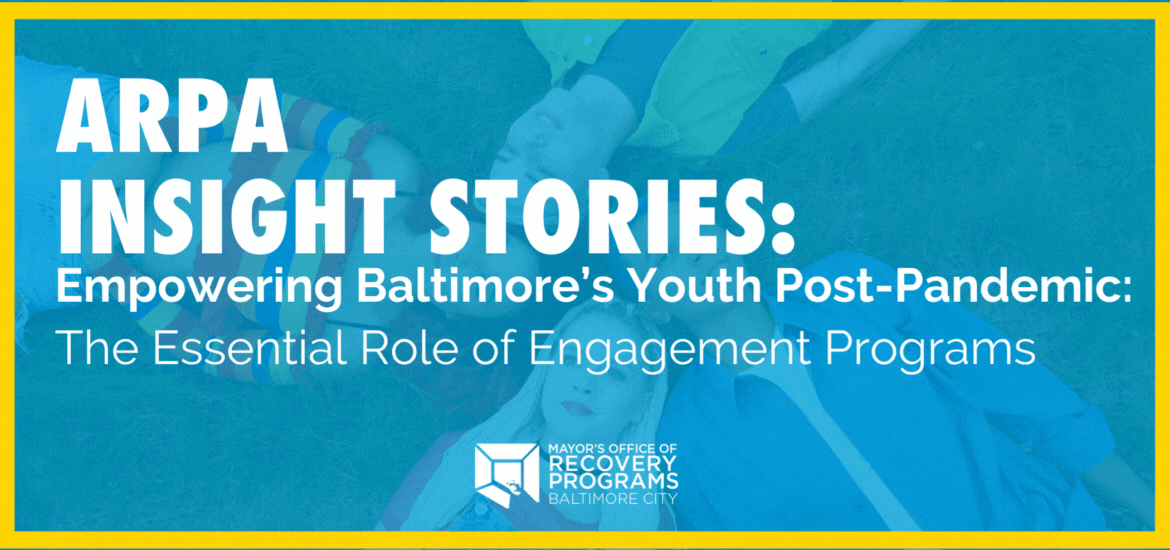February ARPA Newsletter
Thursday Apr 14th, 2022

Letter from the Chief Recovery Officer
Greetings Baltimore,
In July 2021, Mayor Brandon Scott established the Mayor’s Office of Recovery programs to be responsible for administering all aspects of ARPA funding and regularly reporting to the federal government, as well as the public.
It is an honor and privilege to lead Baltimore in its recovery process. As the COVID-19 public health emergency continues to plague Baltimore, we must use funding from the American Rescue Plan Act (ARPA) to mitigate the negative impacts on residents who need help the most.
When the Recovery Office was established, we determined that our guiding principles would be impact, transparency, equity, accountability, and responsibility. These guiding principles steer my team as we serve this city and take action to implement the Mayor’s Recovery Plan for Baltimore. Our role as the Recovery Office is to advise the Mayor and top City leaders on funding strategy, oversee funding, ensure compliance with ARPA, and offer technical assistance to City agencies and other funded organizations as they implement initiatives.
The Scott Administration is thinking with the end in mind and focused on maximizing ARPA funds. To expend ARPA funding by the end of 2026 as required by law, the Recovery Office will:
- Demonstrate progress on measures of equity among City residents. The COVID-19 public health emergency has exacerbated existing inequities plaguing the City. Programs funded by ARPA must deliver real, measurable results to Baltimoreans who need it most.
- Protect the City's General Fund budget. As the City builds innovative evidence-based programs, we cannot overload the City’s budget by absorbing new-long term costs once ARPA funding expires.
- Provide technical assistance and resources for compliance and best practices. As agencies and organizations are funded and stand up programs and initiatives, the Recovery Office will provide training and guidance to ensure compliance with ARPA. We will also review and incorporate best practices from cities and states as well as academic research and evaluation to inform program design and determine the sustainability of programs after ARPA funding expires.
- Collaborate with City leaders to make strategic investments. ARPA is a one-time investment that has the potential to lead to a change in the trajectory for Baltimore City. It is important that we amplify the Mayor’s priorities and strategically allocate funding to initiatives with a high impact on Baltimoreans.
- Spend every dollar. The Recovery Office will make sure that every federal dollar allocated to Baltimore City is spent on eligible uses to prevent returning money to the federal government at the conclusion of the ARPA period.
Please visit the Recovery Office website at arp.baltimorecity.gov for updates on progress with implementing ARPA funding.
In Service,

Shamiah T. Kerney, Chief Recovery Officer
A message to our ARPA Applicants
The Recovery Office received 500 proposals for ARPA funding from city agencies, quasi-government agencies, and nonprofits. On January 6, 2022, the U.S. Department of Treasury provided updated guidance to recipients of ARPA funds. Accordingly, the Recovery Office is reevaluating all submitted proposals for eligibility and to ensure compliance with the law. We are excited that our nonprofit organizations and city agencies are so invested in Baltimore’s recovery process. Our office is matching that excitement by carefully reviewing and vetting every proposal. Due to the volume of proposals received, it will take additional time to review all proposals. Applicants may reference their submitted proposal at any point by accessing our online portal. We appreciate your patience and thank you for your interest in furthering the recovery of Baltimore.
Quarterly Treasury Report

The Mayor's Office of Recovery Programs was established to administer all aspects of ARPA funding and regularly report to the federal government, as well as to the public. You can view both our Treasury Report and a more reader-friendly At-A-Glance version under Reports and Resources on our website.
We are launching our ARPA Reporting Center!
The Mayor's Office of Recovery Programs created a dashboard to share details regarding proposals, funded projects, and project progress. Information on projects is automatically updated. More content will be added to the dashboard as projects progress.
ARPA Townhall Recap




On February 8, 2022, Mayor Brandon M. Scott, Chief Administrative Officer Chris Shorter, and Chief Recovery Officer Shamiah Kerney participated in the #ARPA Telephone Town Hall. Between phone participants and those watching the live stream on the Mayor's Facebook Page, we had over 3,000 people join! If you missed it, you can catch the rewind on Facebook at any time. The Recovery Office looks forward to having more community engagement opportunities about ARPA funding.
Stay in the know!
Important Upcoming Dates for the Mayor's Office of Recovery Programs
Tuesday, February 15, 2022: City Council Oversight Hearing



